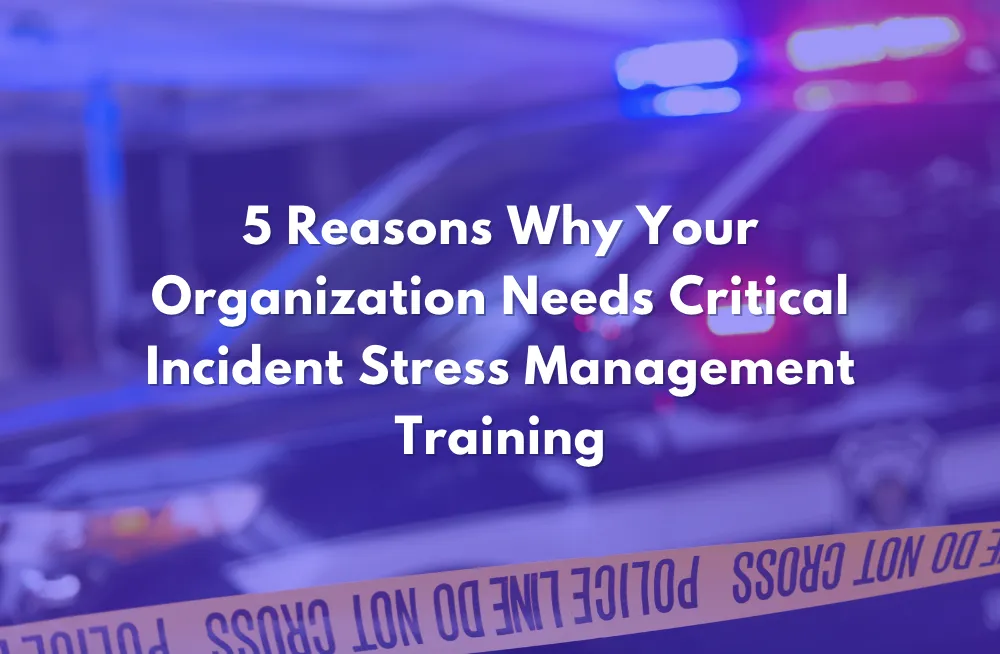5 Reasons Why Your Organization Needs Critical Incident Stress Management Training
It's no secret that job stress can take a toll on your mental and physical health. What you may not know is that traumatic events can also cause critical incident stress in the workplace. Critical incidents are common in the helping professions. This is especially true for emergency services personnel. In this blog post, we'll discuss the effects of traumatic stress on employees and how to deal with it. We'll also introduce you to our recommended critical incident stress management program, CISM.

When an organization experiences a traumatic event, such as a natural disaster, line of duty death, mass shooting, or workplace violence, it's crucial that they have a plan in place for how to deal with the aftermath. This is where critical incident stress management (CISM) comes in. CISM is a comprehensive, evidence-based specialized training program that prepares participants to help their peers who are affected by traumatic events.
Crisis intervention services provide employees with an opportunity to share their experiences and feelings with others who understand what they are going through. First responders and those in emergency medicine may hesitate to talk to mental health professionals. Crisis intervention also helps employees to build relationships and feel connected to their workplace.
The Stress Care Doc can meet all your Critical Incident Stress Management education needs.
Here are five reasons why your team needs CISM training.
1. Critical Incident Stress Management Can Decrease On-the-Job Injuries
When an organization has a team in place, it is less likely to experience work-related injuries. A study by the National Institute for Occupational Safety and Health (NIOSH) found that employees who received support after a traumatic event had fewer work-related injuries. The study looked at data from over 1,600 workers who were involved in traumatic events, such as natural disasters and mass shootings.

The study found that employees who received appropriate support were 50% less likely to have a work-related injury than those who did not receive support. This is likely due to the fact that crisis intervention services provide employees with an opportunity to share their experiences and feelings with others who understand what they are going through. Individual and group crisis interventions also help employees to feel connected to their workplace and build relationships with their co-workers.
Fewer work-related injuries also help your bottom line. When an employee is injured on the job, it can cost the organization a lot of money in terms of medical expenses and lost productivity.
2. Critical Incident Stress Management Can Reduce Absenteeism
Organizations that offer critical incident stress management (CISM) training can reduce absenteeism among their employees.
Employees who participate in crisis intervention services are less likely to miss work due to illness or stress. CISM peer support provides employees with peers who have received specialized training in active listening skills and emotional first aid. This can help employees to feel connected to their workplace and reduce the amount of stress they experience.

When employees are stressed, they are more likely to miss work. According to the American Psychological Association, job-related stress is one of the leading causes of absenteeism in the United States. Stress can cause physical health problems, such as headaches and neck pain, and can also lead to psychological problems, such as anxiety and depression.
When employees feel connected to their workplace and have positive relationships with their co-workers, they are less likely to miss work. In fact, a study by the University of Warwick found that happy employees are less likely to miss work than unhappy employees. The study looked at data from over 8,000 workers in the UK.
When employees are less stressed, they are less likely to miss work for health reasons. Offering CISM training can help your organization save money on lost productivity due to absenteeism.
3. Critical Incident Stress Management Can Lower Employee Turnover Rates
Employee turnover rates can be expensive for organizations. It can cost a company thousands of dollars to find and train a new employee. When an employee leaves a company, it can also have a negative impact on productivity and morale.

Peer support can help to reduce employee turnover rates by providing employees with an opportunity to connect with their workplace and build relationships with their co-workers. When employees feel connected to their workplace and have strong relationships with their co-workers, they are less likely to leave the company.
When an employee is traumatized by a critical event at work, it can lead to increased stress and anxiety. This can cause the employee to feel overwhelmed and may lead to them leaving their job.
Traumatic events can also cause employees to experience flashbacks, nightmares, and intrusive thoughts. These symptoms can be very disruptive to the employee's life and may cause them to miss work.
When employees are less stressed, they are less likely to leave their job. Offering CISM training can help your organization save money on lost productivity due to employee turnover.
4. Critical Incident Stress Management Can Improve Employee Productivity
Organizations that offer CISM training can also see an improvement in productivity among their employees.

When employees are stressed, they are less productive. According to the American Psychological Association, job-related stress is one of the leading causes of decreased productivity in the United States.
When an employee is traumatized by a critical event at work, it can lead to increased stress and anxiety. This can cause the employee to feel overwhelmed and may lead to them feeling less productive.
According to the National Institute for Occupational Safety and Health (NIOSH), when employees receive support from trusted individuals after a traumatic event, they are less likely to experience burnout. Burnout is a state of exhaustion that can lead to decreased productivity.
CISM support teams help to reduce job-related stress, which can lead to an increase in productivity. When employees are less stressed, they are less likely to experience decreased productivity due to illness or stress. Offering CISM training can help your organization save money on lost productivity due to decreased productivity.
5. Critical Incident Stress Management Can Reduce Healthcare Costs
In addition to reducing job-related stress, CISM training can also help reduce the amount of money that organizations spend on healthcare costs for their employees. Stress can lead to physical and mental health problems, which can be expensive to treat. By offering CISM training, you can help reduce the amount of money spent on employee healthcare costs.

By offering CISM training, you can help ensure the well-being of your team members. Providing peer support during times of crisis will not only help reduce job-related stress and healthcare costs, but it will also create an environment where employees feel supported and valued.
The History of Critical Incident Stress Management
Critical Incident Stress Management (CISM) has been around for over 40 years. It was first developed in the 1970s by Dr. Jeffrey Mitchell.
CISM was created in response to the increasing number of critical incidents that emergency responders were experiencing. These critical incidents could include physical trauma, child death, line-of-duty injuries, or even line-of-duty death.
Critical Incident Stress Management is designed to help individuals and groups who have been affected by a traumatic event. The goal of CISM is to mitigate the impact of an event, accelerate the recovery process, and assess the need for additional or alternative services.
From an evidence-based perspective, CISD and variations on the CISD process, when submitted to randomized controlled trials have been shown to be effective with military and emergency services personnel (Adler, et al., 2008; Adler, et al., 2009; Deahl, et al., 2000; Tuckey & Scott, 2013).
CISM is often used in emergency situations, but it can also be used in the workplace. There are several core elements of critical incident stress management.
Critical Incident Stress Management Components
Individual Crisis Intervention
An individual crisis intervention is a one-on-one meeting between a trained peer supporter and an employee who has been affected by a traumatic event. This meeting can be used to provide support and resources to the employee.
The purpose of individual crisis intervention is to provide the employee with an opportunity to talk about their experiences, express their feelings, and receive support from a trusted individual. The peer supporter will listen to the employee and offer resources and support.
During an individual crisis intervention, the peer supporter will assess the need for additional or alternative services. If necessary, they will refer the employee to additional resources.
The two International Critical Incident Stress Foundation (ICISF) core courses are:
- Assisting Individuals in Crisis
- Advanced Assisting Individuals in Crisis
Group Crisis Intervention
There are several group crisis interventions.
Rest Information Transition Services
There are several group crisis interventions. One such intervention is called Rest Information Transition Services (RITS).
RITS are provided for emergency personnel, one time only, at the end of a unit’s first exposure to a major incident in which the majority of on-duty operations personnel were working under intensely stressful conditions and sometimes for a prolonged period of time. The RITS are not a stand-alone intervention. Some form of follow-up is usually required.
Crisis Management Briefings
A Crisis Management Briefing (CMB) is an informational group crisis intervention technique for heterogeneous (mixed) groups or large groups (possibly up to 300 people in the same session in some circumstances.) It may be implemented with civilians after disasters or other large-scale events. It has been utilized in school events, in businesses and industry, in community and church groups. It also may be used with emergency and military groups in the second day of operations and beyond.
Defusing
A defusing is an interactive group process conducted a short time after a homogeneous group has been exposed to a traumatic event. A homogeneous group is an essential requirement for the use of the defusing process. Usually, the defusing is provided within an 8-hour time frame after the traumatic experience. Support is focused on individuals until the CISD can be provided a few days later.
Critical Incident Stress Debriefing
Group crisis intervention is a structured, facilitated meeting between team members who have experienced or witnessed a traumatic event. The purpose of this meeting is to provide group support and allow members to express their feelings in a safe environment.
During a group crisis intervention, participants can share their experiences with one another and receive feedback from their peers. This type of peer-support has been shown to be beneficial for those impacted by trauma, as it helps them identify common issues and develop solutions together.
Critical incident stress management (CISM) training is essential for organizations that want to provide their employees with the support they need in times of crisis. CISM training teaches employees how to provide individual crisis intervention, as well as group crisis interventions.
- The purpose of CISM training is to help employees cope with the negative consequences of job stress. Employees who receive CISM training are more likely to recover from a traumatic event and return to work.
- If your organization does not have a CISM team, we recommend you consider implementing one using the Critical Incident Stress Management model from The International Critical Incident Stress Foundation.
CCISM Certification
The Certified Critical Incident Stress Management (CCISM) certification is a comprehensive exam-based certification designed to test individuals’ knowledge and skills necessary to provide quality critical incident stress management services. The program, developed through the collaboration of several leading institutions, ensures that crisis interventionists have a thorough understanding of the principles and techniques associated with effective critical incident stress management. CCISM certification provides essential recognition for professionals involved in this specialized field who wish to demonstrate their expertise and credibility.
To find out how you can provide this training for your team, go to stresscaredoc.com and click on Let's Talk. We can provide your training on-site or online.
